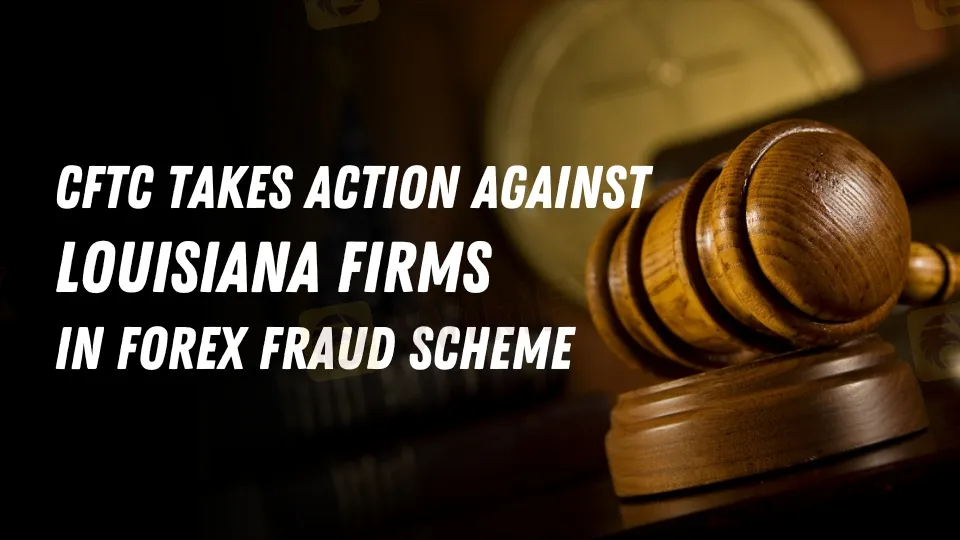简体中文
繁體中文
English
Pусский
日本語
ภาษาไทย
Tiếng Việt
Bahasa Indonesia
Español
हिन्दी
Filippiiniläinen
Français
Deutsch
Português
Türkçe
한국어
العربية
CFTC Takes Action Against Louisiana Firms in Forex Fraud Scheme
Abstract:The CFTC has filed a lawsuit against NOLA FX Capital Management and Meteor, LLC, for defrauding investors out of over $7.6 million in a forex scam.

Washington, DC - The CFTC has filed a civil enforcement action against two Louisiana-based firms, NOLA FX Capital Management, LLC and Meteor, LLC, as well as their creator, Michael B. DePetrillo. The action, filed in the Eastern District of Louisiana, claims that the defendants engaged in a fraudulent commodities pool scheme that resulted in the theft of more than $7.6 million from at least forty participants.
The complaint describes how the defendants solicited contributions from participants under the guise of pooling assets to trade foreign currency pairs leveraged via the NOLA FX Fund, LLC.
From July 2017 until the present, the entities allegedly supplied investors with fake account statements representing profits and trading activity that never happened. Instead of carrying out the promised transactions, DePetrillo and his firms are accused of utilizing the cash for personal purposes and to pay returns to previous investors, in a manner similar to a Ponzi scheme.
NOLA FX Capital and Meteor, according to the CFTC, operated unregistered commodities pools, while DePetrillo was an unlicensed pool operator related person. The CFTC is seeking reimbursement for the victims, civil monetary penalties, trading and registration prohibitions, and a permanent injunction against any future breaches of the Commodity Exchange Act and CFTC rules.
In a related development, the Eastern District of Louisiana US Attorney's Office has filed an additional criminal charge against DePetrillo.
Final Thoughts
This action demonstrates the CFTC's continuous efforts to prevent fraudulent schemes that prey on unwary investors. As financial markets develop, it is critical for investors to do rigorous due diligence and avoid offers that seem too good to be true. Participation in such scams may have disastrous implications for individuals engaged, both financially and legally.

Disclaimer:
The views in this article only represent the author's personal views, and do not constitute investment advice on this platform. This platform does not guarantee the accuracy, completeness and timeliness of the information in the article, and will not be liable for any loss caused by the use of or reliance on the information in the article.
Read more

The Hidden Checklist: Five Unconventional Steps to Vet Your Broker
Forex broker scams continue to evolve, employing new tactics to appear credible and mislead unsuspecting traders. Identifying these fraudulent schemes requires vigilance and strategies beyond the usual advice. Here are five effective methods to help traders assess the legitimacy of a forex broker and avoid potential pitfalls.

Doo Financial Obtains Licenses in BVI and Cayman Islands
Doo Financial, a subsidiary of Singapore-based Doo Group, has expanded its regulatory footprint by securing new offshore licenses from the British Virgin Islands Financial Services Commission (BVI FSC) and the Cayman Islands Monetary Authority (CIMA).

CFI’s New Initiative Aims to Promote Transparency in Trading
A new programme has been launched by CFI to address the growing need for transparency and awareness in online trading. Named “Trading Transparency+: Empowering Awareness and Clarity in Trading,” the initiative seeks to combat misinformation and equip individuals with resources to evaluate whether trading aligns with their financial goals and circumstances.

Malaysian-Thai Fraud Syndicate Dismantled, Millions in Losses Reported
The Royal Malaysia Police (PDRM) has received 26 reports concerning the Nicshare and CommonApps investment schemes, both linked to a major fraudulent syndicate led by a Malaysian citizen. The syndicate’s activities came to light following the arrest of its leader by Thai authorities on 16 December.
WikiFX Broker
Latest News
ASIC Sues Binance Australia Derivatives for Misclassifying Retail Clients
WikiFX Review: Is FxPro Reliable?
Malaysian-Thai Fraud Syndicate Dismantled, Millions in Losses Reported
Trading frauds topped the list of scams in India- Report Reveals
YAMARKETS' Jingle Bells Christmas Offer!
AIMS Broker Review
The Hidden Checklist: Five Unconventional Steps to Vet Your Broker
WikiFX Review: Something You Need to Know About Markets4you
Revolut Leads UK Neobanks in the Digital Banking Revolution
Fusion Markets: Safe Choice or Scam to Avoid?
Currency Calculator


